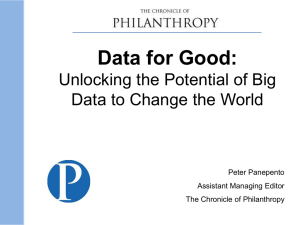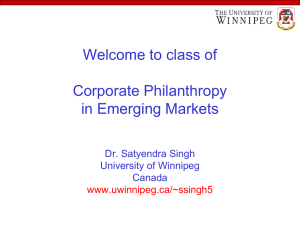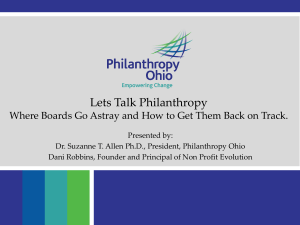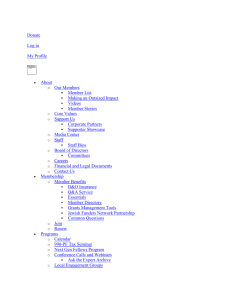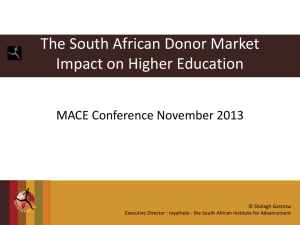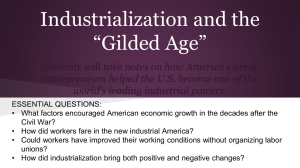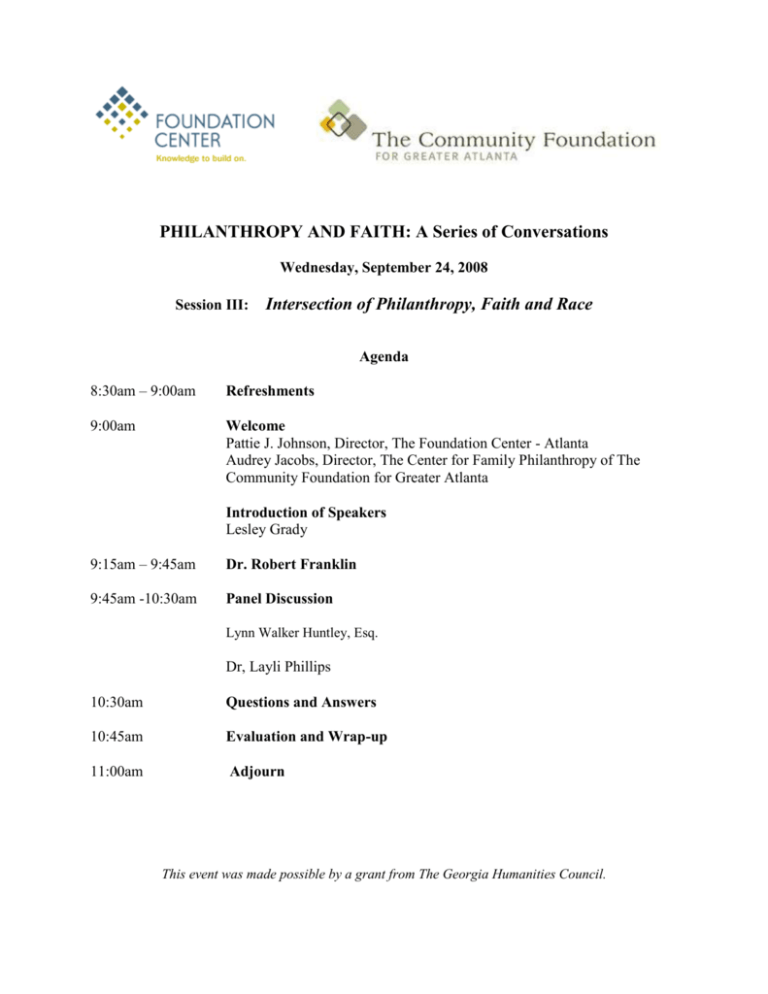
PHILANTHROPY AND FAITH: A Series of Conversations
Wednesday, September 24, 2008
Session III:
Intersection of Philanthropy, Faith and Race
Agenda
8:30am – 9:00am
Refreshments
9:00am
Welcome
Pattie J. Johnson, Director, The Foundation Center - Atlanta
Audrey Jacobs, Director, The Center for Family Philanthropy of The
Community Foundation for Greater Atlanta
Introduction of Speakers
Lesley Grady
9:15am – 9:45am
Dr. Robert Franklin
9:45am -10:30am
Panel Discussion
Lynn Walker Huntley, Esq.
Dr, Layli Phillips
10:30am
Questions and Answers
10:45am
Evaluation and Wrap-up
11:00am
Adjourn
This event was made possible by a grant from The Georgia Humanities Council.
Philanthropy and Faith
A Joint Initiative of The Community Foundation for Greater Atlanta
and the Foundation Center – Atlanta
In 2005, Ambassador James Joseph, Professor of the Practice of Public Policy Studies, Terry Sanford
Institute of Public Policy at Duke University, made a presentation on faith and philanthropy, exploring the
linkages between spirituality and social action. This program, co-sponsored by The Community
Foundation for Greater Atlanta, the Foundation Center – Atlanta, and the Southeastern Council of
Foundations, drew a large audience of over 130 people from the philanthropic, nonprofit, and faith
communities. To follow-up on the public interest in this topic, The Community Foundation and the
Foundation Center are again joining forces to present a four-part series called “Philanthropy and Faith.”
Goals
The goal of the series is to bring the various members of the nonprofit community – nonprofit
organizations, grantmakers, faith leaders – and the public at large together to engage in dialogue about the
intersection of faith and philanthropy. We hope to create several opportunities for dialogue and
exchange, and to bring various organizations, individuals, and members of the faith communities together
to enhance their understanding of faith in meeting the needs of the underserved. Through a series of
meetings that will take place throughout 2008, we will engage various constituencies in a series of
conversations about the interpretation of philanthropy in diverse faiths and the intersection of
philanthropy and faith in service, public policy and through individual experiences. When possible, we
plan to tape presentations and make available as a print transcript and/or a webcast.
Our specific objectives are to increase the knowledge of the nonprofit sector of various faith
communities—the role that each community plays in society, in general; and the importance of faith, in
particular in social services, race, public policy and philanthropy.
Philanthropy and Faith Final Session concludes with
Session IV
Date: November 2008
Theme: Philanthropy, Faith, and Individual Giving
This event will focus on individual philanthropists and how they express their faith and gratitude through
philanthropy. We are considering a panel of individual donors who will share their particular stories of
faith and philanthropy.
2
About the Sponsors
The Community Foundation for Greater Atlanta
The Community Foundation for Greater Atlanta connects donors, nonprofits and community partners to
make philanthropy happen. We do this by working directly with donors and their families to discover
their philanthropic passion; supporting nonprofits in our 23-county service area through grants and
guidance; collaborating with community leaders and other partners to create innovative solutions to tough
issues and building an endowment that will benefit our region today and for generations to come. Please
visit our website at www.atlcf.org for more information.
The Foundation Center – Atlanta
For more than 50 years, the Foundation Center, headquartered in New York, has played a vital role in our
communities, strengthening our nation's nonprofit sector by advancing knowledge about philanthropy. At
our Atlanta library/learning center, we provide grantseekers and grantmakers with the tools that will help
them build their capacity to achieve their missions. Conveniently located near Woodruff Park and
Georgia State University, the Atlanta library/learning center also serves as a meeting ground for those in
the nonprofit sector in our area, bringing people together for learning and discussion. More than 7,000
people visit us each year, and 6,500 are served by programs we offer elsewhere in the area.
The Georgia Humanities Council
The Philanthropy and Faith Series is supported in part by the Georgia Humanities Council, which is
funded through the National Endowment for the Humanities, through appropriations from the Georgia
General Assembly, and through contributions from the public.
3
About the Participants
Session III: Philanthropy, Faith, and Race
Dr. Robert Michael Franklin
Dr. Robert Michael Franklin is the tenth president of Morehouse College, the nation’s largest private,
four-year liberal arts college for men.
Franklin graduated Phi Beta Kappa from Morehouse in 1975 with a degree in political science and
religion. He continued his education at Harvard Divinity School, earning a master of divinity degree in
Christian social ethics and pastoral care in 1978, and the University of Chicago, earning a doctorate in
ethics and society, and religion and the social sciences in 1985. He also undertook international study at
the University of Durham, UK, as a 1973 English Speaking Union Scholar. His major fields of study
include social ethics, psychology and African American religion.
Prior to Morehouse, Franklin was a Presidential Distinguished Professor of Social Ethics at Emory
University, where he provided leadership for a university-wide initiative titled “Confronting the Human
Condition and the Human Experience” and was a senior fellow at the Center for the Study of Law and
Religion at the law school. He has served on the faculties of the University of Chicago, Harvard Divinity
School, Colgate-Rochester Divinity School and at Emory University's Candler School of Theology.
He also has served as program officer in Human Rights and Social Justice at the Ford Foundation, and as
an adviser to the foundation’s president on future funding for religion and public life initiatives.
In 1997, Franklin assumed the presidency of the Interdenominational Theological Center (ITC), the
graduate theological seminary of the Atlanta University Center consortium. He served as the Chautauqua
Institution's Theologian in Residence for the 2005 season.
Franklin is the author of three books: Crisis in the Village: Restoring Hope in African American
Communities (2007); Another Day’s Journey: Black Churches Confronting the American Crisis
(1997); and Liberating Visions: Human Fulfillment and Social Justice in African American Thought
(1990). He has co-authored (Don S. Browning, et. al.) a volume titled From Culture Wars to Common
Ground: Religion and the American Family Debate (2001). He is the co-editor of the forthcoming The
Cambridge Companion to Martin Luther King Jr., published by Cambridge University Press.
Franklin is married to Dr. Cheryl Goffney Franklin, an OB-GYN physician and is the father of three
children: Imani Renee Franklin; Robert M. Franklin III and Julian Michael DeShazier, a 2005 Morehouse
graduate.
Lynn Walker Huntley, Esq.
Lynn Huntley is president of the Southern Education Foundation, a public charity focused on reducing
educational inequality in the American South and abroad for low-income students, with special emphasis on
persons of African descent. An American citizen, Ms. Huntley received her A.B. in Sociology with honors
from Barnard College, and J.D. degree with honors from Columbia University Law School, where she was
a member of The Columbia Law Review.
She worked as law clerk for a federal judge; staff attorney at the NAACP Legal Defense and Educational
Fund, Inc., where she focused on cases involving the abolition of the death penalty, prisoner rights and
4
education desegregation; general counsel to the New York City Commission on Human Rights; section
chief and deputy assistant attorney general, Civil Rights Division, The United States Department of Justice,
where she directed a trial section to vindicate the rights of institutionalized persons, and exercised oversight
of sections concerned with legislative affairs, employment, housing, federal regulatory and budgetary
matters; program officer, deputy director and director of Ford Foundation’s Rights and Social Justice
Program, the division focused on minority and women’s rights, refugee and migration issues, legal services
for the poor, minorities and media, and coordination of field office activities related to the foregoing.
Ms. Huntley conceived and directed the Comparative Human Relations Initiative, an examination of race
and inequality in Brazil, South Africa and the United States and strategies to surmount discrimination. She
is the author of several Beyond Racism reports, and served, with others, as editor of two related books,
Tirando a Mascara (Removing the Mask) and Race and Inequality in South Africa, Brazil and the United
States (2001).
Ms. Huntley has received many honors, including the Thurgood Marshall Award of the Association of the
Bar of the City of New York, the Lucy Terry Prince Award of the Lawyers’ Committee for Civil Rights
Under Law, the Jean Mayer Global Citizenship Award of Tufts University, and the Unsung Heroine Award
of the Atlanta Chapter of 100 Black Women. Ms. Huntley is vice chair of the Board of Directors of CARE
USA, the world’s largest development non-profit organization; and a member of the Board of Directors of
the Jesse Ball duPont Fund; and the Marguerite E. Casey Foundation.
Dr. Layli Phillips
Layli Phillips is Associate Professor and Graduate Director of Women’s Studies and Associated Faculty
of African American Studies at Georgia State University. In 2006, she published The Womanist Reader
(Routledge), a comprehensive anthology documenting the first quarter century of womanist thought and
the first-ever volume to focus on womanism “on its own.”
She has published in numerous academic journals as diverse as Signs, Sexuality and Culture, History of
Psychology, Journal of African American Studies, Journal of African American History, Women and
Therapy, and Identity, as well as numerous edited volumes. From 1994-2000, she served as Founding
Co-Director of the Womanist Studies Consortium, a Rockefeller Humanities Fellowships Residency
Program and Founding Co-Editor of the journal The Womanist (later Womanist Theory & Research). She
teaches courses in womanism, Black feminist thought, women and Hip Hop, and the African American
LGBTQIQ experience.
In addition to the areas mentioned above, she also conducts biographical research on Drs. Kenneth B. and
Mamie P. Clark and writes on liberation psychology. Her emerging interests include applied womanism
and spiritual activism. She is a member of the Advisory Council of the Atlanta Women’s Foundation’s
Faith, Feminism, and Philanthropy project, as well as the Board of Directors of Radical Scholar, Inc., and
Foreverfamily (formerly Aid to Children of Imprisoned Mothers). She also participates in Ms.
Magazine’s Committee of Scholars and is a member of the Editorial Collective of the journal Feminist
Studies. She holds a Ph.D. in Psychology from Temple University, an M.S. in Psychology from Penn
State, and a B.A. from Spelman College, where she majored in Philosophy. Her extracurricular research
focuses on matters of spirituality and human wellbeing, which inform her perspectives on social justice
and social change. She is the mother of two adult children, one on each coast.
Dr. Kathy Palumbo
Kathy is the Director of Programs for The Community Foundation for Greater Atlanta. In this position,
Kathy is responsible for the management and oversight of the Foundation’s Competitive Grants Program,
scholarships and other grantmaking programs. She also works closely with the Philanthropic Services and
5
Finance departments to develop strategies for achieving community impact through donor engagement
and support, and she also manages community leadership activities. She is a member of United Way’s
Great Ideas Advisory Committee, a board member of The Georgia Forum, a member of the Local FEMA
board and on the editorial board of The Foundation Review.
Palumbo came to the Foundation in 2006 with a wealth of experience in community-building, leadership,
legislative advocacy, management and public policy, most recently from an18-year tenure at the Atlanta
Community Food Bank where she served as community services director. Prior to joining the Food
Bank, she held several positions in the nonprofit and academic arenas. Kathy holds a Ph.D. from Emory
University and a Masters of Social Work from Case Western Reserve University. She earned her
undergraduate degree from the College of Wooster in Ohio.
Moderator, Lesley Grady
Lesley joined The Community for Greater Atlanta in 2000 as Senior Program Officer with responsibility
for the Foundation's grantmaking department and related community initiatives. In 2002 she was
appointed Vice President of Community Partnerships, which includes all of the Foundation’s
discretionary grantmaking, scholarships, community initiatives and partnerships, research, and outreach
and response to Foundation donors related to community/social needs. Lesley has more than 25 years’
experience working in community development. Immediately prior to joining the Community Foundation
for Greater Atlanta, she worked as an independent contractor for corporations, nonprofit organizations
and governmental entities. Her work included administering corporate philanthropic giving; developing
funding feasibility studies; training, strategic planning; program design and volunteer coordination. Her
clients included John Wieland Homes & Neighborhoods, United Way of Metro Atlanta, Leadership
Strategies, Inc. and the Atlanta Public Schools. Lesley served from 1989 to 1995 as Vice President of
Education for the Metro Atlanta Chamber of Commerce. Lesley has a Masters of Public Policy from
Georgia State University and a BA in English from LaSalle University.
Prior to Morehouse, Franklin was a Presidential Distinguished Professor of Social Ethics at Emory
University, where he provided leadership for a university-wide initiative titled “Confronting the Human
Condition and the Human Experience” and was a senior fellow at the Center for the Study of Law and
Religion at the law school.
6
The Intersection of Philanthropy, Faith and Race
Bibliography
(Materials available at the Foundation Center – Atlanta)
Bentley, Richard J. "Speaking to a higher authority: teaching philanthropy in religious settings".
New Directions for Philanthropic Fundraising vol. 36 (Summer 2002) p. 21-36.
Abstract: Argues that faith-based organizations are the proper situations for philanthropic training, outlining the
traditions of giving of the Jewish, Christian and Islamic faiths. Offers various options to further such efforts, in
congregations, schools, and homes. With bibliographic references.
Ebaugh, Helen Rose; Chafetz, Janet S.; Pipes, Paula. "Funding good works: funding sources of
faith-based social service coalitions". Nonprofit and Voluntary Sector Quarterly vol. 34 (December
2005) p. 448-72.
Abstract: The authors sought to determine the sources of funding of faith-based organizations, noting that most
support of religious organizations is by individual donors. A broad mix of sources is cited, including government,
foundations, United Ways, corporations, and fees. The respondents were also asked to rate attitudes toward different
funding sources, and the researchers determine which organizational characteristics are associated with each
source. With bibliographical references.
Elliott, Barbara J. Equipping the saints: a guide for giving to faith-based organizations.
Philadelphia, PA: Templeton Foundation Press. 2005. 86 p.
Abstract: Topics covered in the handbook include: why an individual donor or foundation would give to faith-based
groups; what questions to ask organizations before giving; and how to evaluate programs. Also describes various
approaches to giving and provides examples. Appendix includes worksheets and checklists to help donors.
Call #: 580 ELL
Esposito, Virginia M.; Foote, Joseph. "Faith and family philanthropy: stories of giving from faithguided family grant makers". New Directions for Philanthropic Fundraising vol. 35 (Spring 2002) p.
15-22.
Abstract: Though much attention has been given recently to government funding for faith-based programs, this
article addresses the issue of faith-based giving by families. The work of several religious denominations and
umbrella groups is profiled, and two families tell about their spiritual giving.
Faith and family philanthropy: grace, gratitude, and generosity. Washington, DC: National Center
for Family Philanthropy. 2001. viii, 122 p.
Abstract: Published as volume 4 of the National Center Journal. Chapters are "Building a Foundation for Faith and
Family Philanthropy" by James A. Joseph; "Thinking About the Why of Giving" by Claire L. Gaudiani; "Wealth and
Giving: Notes from a Spiritual Frontier" by David G. Trickett; "The Gospel of Wealth" by Andrew Carnegie; "An
African-American Family's Experience" by Lester A. Picker; "A Muslim Family's Experience" by Lester A Picker; "A
Jewish Family's Experience" by Lynn Schusterman; "A Coptic Christian Family's Experience" by Lester A. Picker; "A
Protestant Family's Experience" by Robert H. Hull; "When Congregations Offer Guidance on Philanthropy" by Claude
O. Norcott; "How Catholic Family Philanthropy Keeps a Hallowed Tradition" by Francis J. Butler; "Finding Grace,
Gratitude, and Generosity in the Episcopal Church" by Richard A. Lord; "Rediscovering the Native-American
Experience" by Rebecca L. Adamson; "Families of Faith Support Healthcare for the Working Poor in Memphis" by
Claude O. Norcott; and "Alan B. Slifka: One Man's Faith-Based Mission" by Deanne Stone.
Call #: 514 NAT Vol. 4
Faith & philanthropy: the connection between charitable behavior and giving to religion.
Washington, DC: Independent Sector. 2002. 36 p.
Abstract: Presents data extracted from the Giving and Volunteering in the United States 2001 national survey.
Subject File #: 295
Fischer, Robert L. "The devil is in the details: implementing secular outcome measurement
methods in faith-based organizations". Nonprofit Management & Leadership vol. 15 (Fall 2004) p.
25-40.
Abstract: In January 2002, Congress enacted and financed the Compassionate Capital Fund. Concurrently, there
7
has been increased interest in evaluation of the faith-based programs that are receiving funding. Fischer explicates
suitable models for social service outcome measurement, and also discusses some possible limitations. With
bibliographical references.
Foundation Center. Grants for religion, religious welfare and religious education. New York, NY:
Foundation Center. 2006. xx, 263 p.
Abstract: Lists 14,899 grants of $10,000 or more made by 992 foundations, mostly in 2004 and 2005, for churches,
synagogues, religious orders, missionary societies, associations, and institutions and organizations concerned with
religious issues. Also included are grants for religious welfare and religious education. Grants are indexed by
recipient name, location, and subject.
Call #: REF GRA 011
Gunderson, Gary. Deeply woven roots: improving the quality of life in your community.
Minneapolis, MN: Fortress Press. 1997. xv, 135 p.
Abstract: Describes how religious organizations can improve community life and health care.
Call #: 295 GUN
Harnessing civic and faith-based power to fight poverty. Washington, DC: Working Group on
Human Needs and Faith-Based and Community Initiatives. 2003. 66 p.
Subject File #: 270
Hrywna, Mark. "Giving hits record $295 billion: faith groups trending downward as a percentage of
individual giving". NonProfit Times vol. 21 (1 July 2007) p. 17-9.
Abstract: The article summarizes findings from Giving USA 2007.
Subject File #: 401 Full Text Available http://www.nptimes.com/07Jul/Giving%20SR.pdf
Hurty, Kathleen S. Women, faith & philanthropy: National Conversation monograph. San
Francisco, CA: Women s Funding Network. 2006. 46 p.
Abstract: A group of 45 women from women’s funds and from Jewish, Christian and Muslim women’s organizations
participated in a conference with the goal of forming partnerships for philanthropic and inter-religious collaboration in
order to bring about change. This monograph is both an analysis of the National Conversation and an invitation to
continue the dialogue in local and regional arenas.
Subject File #: 180 Full Text Available http://www.wfnet.org/documents/publications/WFN_Monograph.pdf
Ilchman, Warren F. (ed.); Katz, Stanley N. (ed.); Queen, Edward L., II (ed.) Philanthropy in the
world's traditions. Bloomington, IN: Indiana University Press. 1998. xv, 382 p.
Abstract: Defining philanthropy as giving and sharing beyond the family, various specialists analyze different cultures
within historical contexts. Focus includes geographical areas of Africa, North America, India, China, Japan, Russia,
and Latin America and the traditions of the Buddhist, Islam, Native American, Confucian, Jewish, Christian, and
Hindu religions.
Call #: 310 ILC
Independent Sector (comp.) The role of faith-based organizations in the social welfare system.
Washington, DC: Independent Sector. 2003. 548 p.
Abstract: A collection of papers for Independent Sector's 2003 Spring Research Forum that discusses how religious
organizations provide social services. Authors analyze the effects of Charitable Choice and government funding on
faith-based organizations. Also examines collaborative efforts and evaluation techniques at religious organizations.
Concludes with a section that explores the impact of faith on giving and volunteering.
Call #: A 010 IND SRF 2003
Jackson, Rodney M. (ed.) Philanthropy and the Black church: new problems/new visions. Vienna,
VA: Corporation for Philanthropy. 2000. ii, 115 p.
Abstract: Contents include: "Where Charity Begins: Philanthropy in African American Churches" by Victor N.
Smythe; "African American Churches: Continuing Leadership for New Realities" by Emmett D. Carson; "New
Strategies for Historic Problems: Creative Outreach Programs Sponsored by African American Churches" by Alicia D.
Byrd; "The Churches" by Alicia D. Byrd, Annette Gilliam, and Rodney M. Jackson; "Intermediary Organizations:
Enablers of the Development Visions of Black Churches" by Alicia D. Byrd and Rodney M. Jackson; and "A Directory
of Foundations and Corporations that Support Religious Organizations that Provide Philanthropic Services."
Call #: 295 BYR 2000
8
Jeavons, Thomas H. "Being faithful". Nonprofit Quarterly vol. 8 (July 2001) p. 37-9.
Abstract: Explores the meaning of "faith-based organizations" and discusses faithfulness in religious groups,
businesses, and nonprofits. Suggests that all organizations should preserve institutional integrity and uphold the
values and beliefs they were founded upon.
Subject File #: 600
McCarthy, John D.; Walker, Edward T. "Alternative organizational repertoires of poor people’s
social movement organizations". Nonprofit and Voluntary Sector Quarterly vol. 33--Supplement
(September 2004) p. 97S-119S.
Abstract: In poorer communities, congregational-based organizations and membership organizations are both
available. The researchers compare the two types of groups, based on data collected from more than 200 entities.
Statistical tables and summaries are provided. With bibliographical references.
Morehead, Jenai; Morehead, Jeffrey C. Empowering you to help: resources for faith-based
nonprofits. Lincoln, NE: iUniverse Inc. 2003. 54 p.
Abstract: Basic fundraising and proposal writing guidance for leaders of faith-based organizations.
Call #: 295 MOR
Nober, Jane C. "Faith-based grantmaking: a basic guide for the perplexed". Foundation News &
Commentary vol. 42 (May-June 2001) p. 20-1.
Abstract: Legal considerations in relation to grants to churches, mosques, synagogues and other faith-based
institutions.
Queen, Edward L., II (ed.) Serving those in need: a handbook for managing faith-based human
services organizations. San Francisco, CA: Jossey-Bass Publishers. 2000. xiii, 305 p.
Abstract: The contents, provided by various contributors, cover various aspects of interest to congregations involved
in delivery of human services, and include "Religion and the Emerging Context of Service Delivery" by Edward L.
Queen II; "Congregations and Social Ministry: Preparation and Development" by Carl S. Dudley; "Congregations and
Communities: Working Together" by John P. Kretzmann; "Holding the Mission in Trust: Effective Board Leadership"
by James B. Lemler; "Funding the Dream" by Sara Robertson; "Identifying the Organization's Key Stakeholders" by
Mary Tschirhart and Eric Knueve; "Developing Financial Accountability and Controls" by John Zietlow; "Finding Help
and Advice at the School Next Door: Working with Academic Institutions" by Arthur Emery Farnsley III; "Deciding
Whether and When to Seek Government Funds" by Stephen V. Monsma; "Working with Foundations" by Edward L.
Queen II; "Community-Based Economic Development" by Eric Clay and Elliott Wright; "Congregations and the
Delivery of Health Care Services" by Sandra C. Burgener; and "Faith-Based Initiatives with High-Risk Youth" by
Harold Dean Trulear. Indexed.
Call #: 604 QUE
Sinclair, Matthew. "Special report: give and go". NonProfit Times vol. 19 (1 March 2005) p. 22-5.
Abstract: A survey conducted in January 2005 by Opinion Research for the publications "NonProfit Times" and
"Contemporary Long Term Care," suggests Americans prefer giving to health care or long term care organizations
that are faith-based. The article provides a brief analysis of the survey results and includes several charts.
Subject File #: 458 Full Text Available http://www.nptimes.com/Mar05/sr1.html
Slessarev-Jamir, Helene. "Exploring the attraction of local congregations to community
organizations". Nonprofit and Voluntary Sector Quarterly vol. 33 (December 2004) p. 585-605.
Abstract: Interviews with 15 pastors of churches that are active in faith-based community organizing programs
elucidate the motivations and rewards for this pursuit. The pastors work in churches in New Orleans, Milwaukee, and
Chicago. Variations exist in the level of grassroots activism among the 15 congregations, but the author determined
several results in common. With bibliographical references.
Wuthnow, Robert; Hodgkinson, Virginia A.; Hall, Peter Dobkin; Schervish, Paul G. Faith and
philanthropy in America: exploring the role of religion in America's voluntary sector. 1st ed. San
Francisco, CA: Jossey-Bass Publishers. 1990. xxi, 327 p.
Abstract: Contains fourteen essays by authorities in the nonprofit sector which examine voluntarism and giving
among members of various religious groups--Catholics, Jews, Protestants, Mormons, black Christians--in America.
Part 1, Understanding the Links Between Religion and Giving, includes Robert Wuthnow's "Religion and the
Voluntary Spirit in the United States: Mapping the Terrain", Max L. Stackhouse's "Religion and the Social Space for
Voluntary Institutions", Peter Dobkin Hall's "The History of Religious Philanthropy in America", Paul G. Schervish's
9
"Wealth and the Spiritual Secret of Money". The six essays in Part 2, Patterns of Giving and Volunteering in the Major
Faith Traditions, are Virginia Hodgkinson's, Murray S. Weitzman's and Arthur D. Kirsch's "From Commitment to
Action: How Religious Involvement Affects Giving and Volunteering", William E. McManus' "Stewardship and
Almsgiving in the Roman Catholic Tradition", Mordechai Rimor's and Gary A. Tobin's "Jewish Giving Patterns to
Jewish and Non-Jewish Philanthropy", James R. Wood's "Liberal Protestant Social Action in a Period of Decline",
Timothy T. Clydesdale's "Soul-Winning and Social Work: Giving and Caring in the Evangelical Tradition", Dean L.
May's "The Philanthropy Dilemma: The Mormon Church Experience", Emmett D. Carson's "Patterns of Giving in
Black Churches". Part 3, The Future of Philanthropy in Religious Institutions, concludes with Wood's "Alternatives to
Religion in the Promotion of Philanthropy", Wuthnow's "Improving Our Understanding of Religion and Giving: Key
Issues for Research", and Hodgkinson's "The Future of Individual Giving and Volunteering: The Inseparable Link
Between Religious Community and Individual Generosity". There is an index and most of the essays include
bibliographical references.
Call #: 407 WUT
Wuthnow, Robert. Saving America? Faith-based services and the future of civil society. Princeton,
NJ: Princeton University Press. 2004. xviii, 354 p.
Abstract: Drawing from several surveys of religious organizations that provide social services within their
communities, Wuthrow addresses the question of whether faith-based organizations are the best providers of such
services, considering the impact and merit of government support to religious entities. With bibliographical references
and index.
Call #: 295 WUT SAV
Ylvisaker, Paul N. "Foundations and faith keeping". Foundation News & Commentary vol. 37
(January-February 1996) p. 21-4.
Abstract: Reprints Paul Ylvisaker's perspective on philanthropy written thirty years ago. Ylvisaker was director of the
Public Affairs Program at the Ford Foundation from 1955-1967 and served as a foundation trustee for the Mary
Reynolds Babcock Foundation.
Copyright © 2008, The Foundation Center. All rights reserved. Permission to use, copy, and/or distribute this document in whole or in part for
non-commercial purposes without fee is hereby granted provided that this notice and appropriate credit to the Foundation Center is included
in all copies. Commercial use of this document requires prior written consent from the Foundation Center.
10

